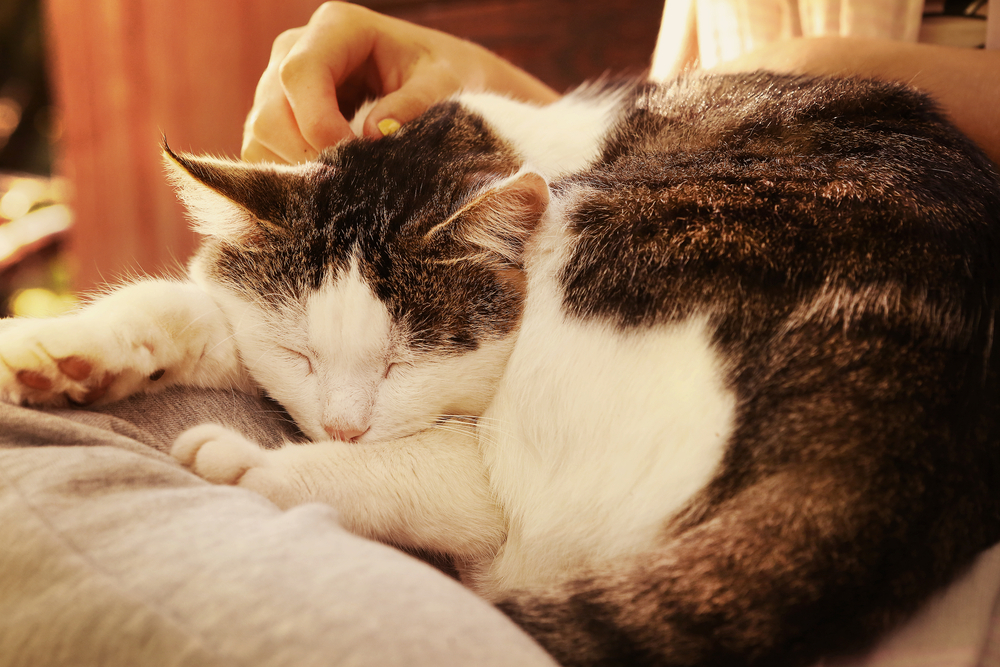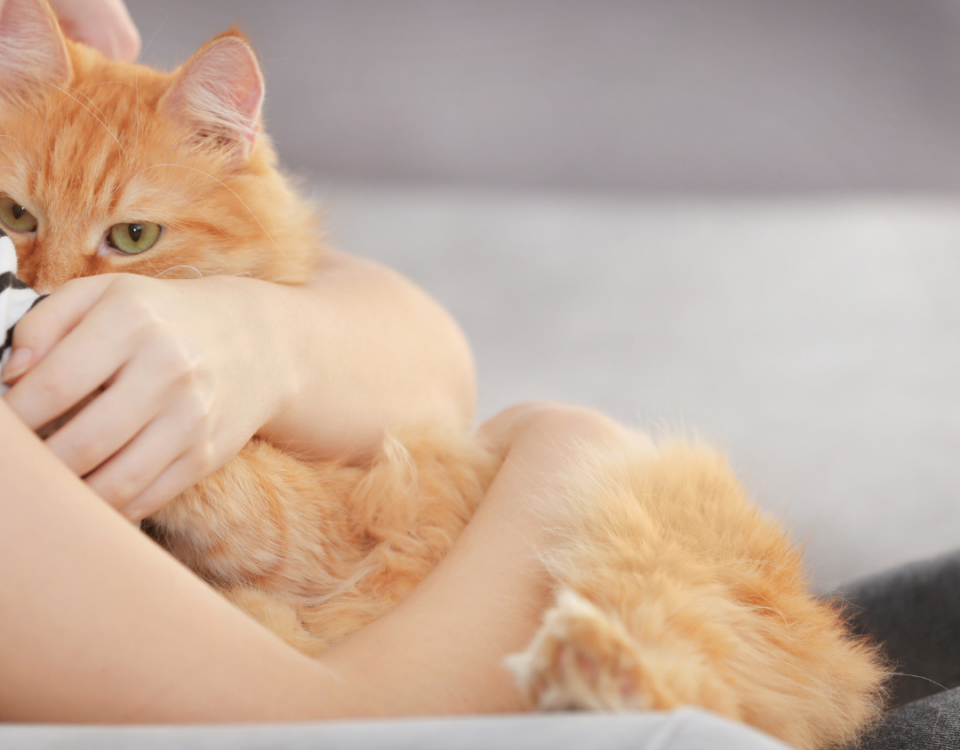
When to Euthanize a Cat with Feline Dementia
August 13, 2021


Lethargic cat? Here is why you need a vet ASAP
August 27, 2021


If your cat has kidney disease, when to euthanize may be something you need to think about.
Sadly, age-related kidney disease in older cats is very common. Scientists estimate that one in three cats over the age of ten can be diagnosed with kidney disease
Chronic kidney disease (CKD) in cats is the persistent loss of their kidney function over time. Healthy kidneys perform many important functions, most notably filtering the blood and making urine, so problems with kidney function can result in a variety of health problems for a cat
Problems with kidney function can cause a variety of health issues for your cat with them feeling unwell. And as they lose important vitamins and proteins the results can be severe. Learn more about kidney disease in cats – when to euthanise here…
Understanding Feline Renal Disease
Renal failure in cats progresses in different stages – beginning with mild early disease – and developing to end-stage. Kidney failure in cats – final stages are technically defined as a less than 10% of normal renal function.
CKD can be seen in cats of any age, but is most commonly seen in middle-aged to older cats. It becomes increasingly common with age. It has been estimated that between 20-50% of cats over 15 years of age will have some degree of CKD.
Kidney failure can be categorised as acute or chronic. Chronic kidney failure is the loss of the functional units of the kidney – known as nephrons. Once damaged they can’t be replaced, as happens during every day wear and tear – or due to a bout of acute kidney failure.


Signs of Renal Failure in Cats
Symptoms of kidney failure in cats vary and not all cats will experience the indicators which range from blindness to depression.
What are the symptoms of kidney disease in cats?
Cats are very good at hiding when they are unwell, so we must be vigilant to spot the early signs of illness. Symptoms that you might spot if your cat has kidney disease include:
- Drinking and urinating more
- Sleeping more (lethargy)
- Losing weight
- Eating less
- Vomiting
- Loose stools OR constipation
However, in the early stages of kidney disease, cats may show no symptoms at all.
Diagnosis of Feline Kidney Disease
Your vet will need to carry out a clinical examination to determine whether further testing will be required. A blood test will measure the amounts of blood urea nitrogen and creatinine – a high level will point to abnormal kidney filtering. A high level of phosphorus is also an indicative mark as it accumulates in the blood.
How would my vet diagnose my cat with kidney disease?
Cats with early kidney disease will often appear normal when a vet examines them, so they will need to have blood and urine tests done to diagnose kidney problems.
In more advanced kidney disease, the symptoms may be more obvious, and so your vet may be suspicious of a kidney problem. They might also feel some changes to your cat’s kidneys – for example, they may feel smaller and more irregular than normal, or one kidney may be larger than the other. However, they will still need to run the same blood and urine tests to confirm that your cat has kidney disease, rather than another illness that can cause similar symptoms, such as diabetes or hyperthyroidism.
Occasionally, kidney problems in cats may be caused by something other than age-related changes. If your vet is concerned that there may be another problem – such as kidney stones, cancer, or an infection – then they may recommend an ultrasound scan or x-rays to check.
Further examination may also show evidence of nodules or cyst on the kidney that may indicate cancer. Or kidneys may be undersized or abnormal in shape. Lymph nodes may also be enlarged.
Cat Kidney Failure Treatment
Each cat with kidney disease is different and needs their own tailor-made treatment plan devised by their own vet. These are just some of the treatments that can be useful in treating kidney disease.
Diet Recommendations
Kidney diets are one of the most effective treatments that we have for kidney disease in cats. There is good evidence that they can reduce the symptoms of kidney disease, and also extend cats’ lifespans significantly compared with cats who eat regular food. Wet kidney diets are best, but dry kidney diets are better than regular wet food.
Success in treating cats with chronic kidney disease has also been related to diet. Homemade diets with 40% protein calories and 60% fat mixed with supplements such as fish oil have proven to aid recovery.
Supplementing your cats’ diet with omega-3 fatty acids keeps kidney inflammation in check. Research has shown that cats that eat high amounts of fish oil have a longer life expectancy – as it slows the progression of kidney disease.
Regular Drinking
Kidney disease makes cats prone to dehydration, so it is important to encourage them to drink regularly. Make sure your cat has two or three different options of places around the house where they can go to drink. Water bowls should always be kept away from food bowls or litter trays, as this may discourage cats from using them.
Some cats prefer to drink from moving water, so you could try offering your cat a water fountain. However, some cats will prefer still water.
Treat The Symptoms
There are many different medications available that will help to relieve the symptoms of kidney disease. These include medications to reduce nausea, improve appetite, or treat diarrhoea or constipation. If your cat is experiencing symptoms from their kidney disease, speak to your vet about the treatment options.
Blood Pressure Medication
High blood pressure is common in cats with kidney disease. It often has no symptoms in the early stages, but can cause damage throughout the body, including the brain, heart, eyes, and kidneys. Your vet can monitor your cat’s blood pressure, and prescribe medication when it is needed.
Reduce Protein Loss
Kidney disease can lead to protein being lost in your cat’s urine. This protein can cause damage to the kidneys, and also means that your cat may lose weight more quickly, too. Protein levels in the urine can be measured, and your vet can arrange medication for your cat if necessary.
Life Expectancy
For chronic renal failure there is no cure – but with appropriate treatment, your cat may live for months or even years – the median figure comes in at between less than two years up to almost six years.
What is the prognosis for a cat with kidney disease?
Kidney disease in cats is a life-limiting condition, but many cats will live with kidney disease for some time. How long a cat is likely to live will depend on how severe their kidney disease is.
Cats with Stage II kidney disease
(which is the earliest stage they can reliably be diagnosed) will, on average, live for at least a year after diagnosis—some studies suggest this may be more like two or three years. Cats with Stage III disease have an average life expectancy of between 6 months and 18 months. Sadly, cats with Stage IV disease will usually only live for a month or two after diagnosis.
Your vet should be able to tell you what stage your cat’s kidney disease is at.
Gentle at Home Cat Euthanasia Following Kidney Failure
Most cats with kidney disease will need to be put to sleep once their symptoms become severe – it is rare for cats to pass away by themselves before this. This means that it’s important to monitor your cat’s quality of life carefully, so you can make the decision at the right time as the kidney failure in cats final stages approach.
It can be difficult to tell how well cats are coping with being ill. In general, it is best to look at the balance between the good and bad parts of your cat’s daily life. If the good parts outweigh the bad, then it is likely your cat still has a life worth living. However, if the bad parts are outweighing the good, then it may be time to take the decision to let them go.
In particular, you can consider:
- Is my cat enjoying their food?
- Is my cat still managing to play like they used to?
- Does my cat still enjoy spending time with humans or other cats?
- Is my cat coping with the symptoms of their illness?
Losing our cats is not something that we like to think about, but it can make the process easier if you have planned and prepared in advance. In particular, think about:
- Where you would like your cat to pass away when the time comes,
- Who you would like to be present
- What you would like to happen with their body afterwards.
You may wish to discuss these things with your family as well, to make sure that everyone is prepared.
Sadly, cat euthanasia at home may be your final option for kidney disease. You’ll be able to discuss home visit services with an understanding vet – and get all the help and support you need at this difficult time.
The procedure will be clearly and simply explained. A mild sedative will be administered that sends your pet into a peaceful sleep. Then an anaesthetic agent will cause the heart to slow and calmly stop. And your cat will peacefully pass away surrounded by loved ones.



